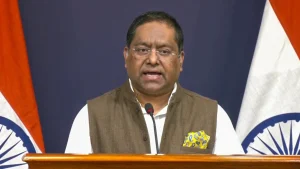New Delhi – A shocking incident involving 3 Indians Abducted In Mali has sent ripples through diplomatic circles as Al-Qaeda-linked terrorists launched a coordinated assault on a cement manufacturing facility. The abduction occurred at the Diamond Cement Factory in Kayes, a region in western Mali, when heavily armed attackers stormed the premises and took Indian workers hostage on July 1.
The case of 3 Indians Abducted In Mali represents one of the most serious security incidents involving Indian nationals in West Africa in recent times. Officials have confirmed that the attack was carried out by terrorists with suspected links to the banned terror outfit Al-Qaeda, highlighting the deteriorating security situation in the Sahel region.
Al-Qaeda-Linked Group Behind Malian Hostage Crisis


Intelligence sources strongly suspect that Jama’at Nusrat al-Islam wal-Muslimin (JNIM), an Al-Qaeda affiliate, orchestrated the incident involving 3 Indians Abducted In Mali. This terror organization has established a pattern of violent attacks across Mali, making it a primary suspect in this latest hostage situation.
JNIM has carried out multiple devastating attacks throughout Mali, targeting both civilian and military installations. The group’s involvement in the case of 3 Indians Abducted In Mali follows their established modus operandi of coordinated assaults on industrial facilities and foreign workers in the region.
The terror group’s sophisticated approach to the 3 Indians Abducted In Mali incident demonstrates their capability to plan and execute complex operations against international targets, raising serious concerns about the safety of foreign nationals working in Mali’s industrial sector.
India’s Strong Diplomatic Response

India’s Ministry of External Affairs (MEA) has responded swiftly to the crisis involving 3 Indians Abducted In Mali, issuing strong condemnation of what officials termed a “deplorable act of violence.” The MEA’s official statement emphasized India’s unwavering commitment to securing the safe return of its citizens.
“The incident occurred on July 1, when a group of armed assailants carried out a coordinated attack on the factory premises and forcibly took three Indian nationals as hostages,” the MEA statement revealed about the 3 Indians Abducted In Mali situation. The ministry called upon the Mali government to take all necessary steps for the safe return of Indian nationals.
The MEA’s response to 3 Indians Abducted In Mali reflects India’s growing concern about the safety of its citizens working in conflict-prone regions across Africa. The ministry has made it clear that securing the hostages’ release remains the government’s top priority.
Embassy Coordination and Rescue Efforts
The Indian Embassy in Bamako has mobilized all available resources to address the crisis of 3 Indians Abducted In Mali. Embassy officials are maintaining “close and constant touch” with Malian authorities, local law enforcement agencies, and the management of Diamond Cement Factory to coordinate rescue efforts.
Also Read: PM Modi Ghana Visit: Historic Breakthrough Transforms Bilateral Relations
Diplomatic sources confirm that the embassy’s response to 3 Indians Abducted In Mali involves multi-level engagement with various stakeholders. The mission is working around the clock to establish communication channels that could facilitate negotiations for the hostages’ safe release.
The embassy’s handling of the 3 Indians Abducted In Mali crisis includes regular briefings to the families of the abducted workers. Officials are ensuring that family members receive timely updates about rescue efforts and any developments in the hostage situation.
High-Level Government Monitoring


Senior officials within India’s Ministry of External Affairs are closely monitoring the situation involving 3 Indians Abducted In Mali. The high-level attention to this crisis reflects the government’s commitment to protecting Indian citizens abroad and its determination to secure their safe return.
The monitoring mechanism for the 3 Indians Abducted In Mali case involves continuous assessment of security conditions, evaluation of rescue options, and coordination with international partners who might assist in the operation. Officials remain engaged at various levels to facilitate the earliest possible resolution.
Government sources indicate that the response to 3 Indians Abducted In Mali includes exploration of all diplomatic channels and potential negotiation frameworks that could lead to the hostages’ safe release without compromising India’s policy against terrorism.
Security Situation in Mali’s Industrial Sector
The incident involving 3 Indians Abducted In Mali highlights the deteriorating security environment facing international businesses operating in Mali. The Diamond Cement Factory attack demonstrates how industrial facilities have become attractive targets for terrorist organizations seeking to maximize international attention and leverage.
The targeting of Indian workers in the 3 Indians Abducted In Mali incident reflects a broader pattern of attacks against foreign nationals in West Africa’s Sahel region. Industrial installations, particularly those with international workforce, face increasing security threats from various terrorist groups operating in the area.
Security analysts note that the 3 Indians Abducted In Mali case underscores the need for enhanced protection measures for international workers in Mali’s industrial sector, particularly in regions with significant terrorist activity.
Advisory for Indian Community in Mali
Following the 3 Indians Abducted In Mali incident, the MEA has issued comprehensive safety advisories for all Indians living and working in Mali. The ministry has urged extreme caution and vigilance among the Indian community, emphasizing the need for regular contact with embassy officials.
The advisory related to 3 Indians Abducted In Mali specifically recommends that Indian nationals maintain regular communication with the embassy for updates and assistance. Officials stress that the security situation requires heightened awareness and proactive safety measures.
The guidance issued after the 3 Indians Abducted In Mali incident includes recommendations for avoiding high-risk areas, maintaining low profiles, and immediately reporting any suspicious activities to local authorities and the Indian Embassy.
International Implications and Regional Security
The case of 3 Indians Abducted In Mali has broader implications for international security cooperation in West Africa. The incident highlights the transnational nature of terrorist threats and the need for coordinated international responses to hostage situations.
Regional security experts view the 3 Indians Abducted In Mali incident as part of a larger pattern of terrorist activities that threaten economic development and international investment in the Sahel region. The attack could potentially impact future Indian business interests in Mali and neighboring countries.
The international attention generated by 3 Indians Abducted In Mali may prompt enhanced security cooperation between India and Mali, potentially leading to improved protection mechanisms for foreign workers in high-risk environments.
Ongoing Rescue Operations and Future Prospects
As rescue efforts continue for the 3 Indians Abducted In Mali, diplomatic and security agencies remain focused on achieving a peaceful resolution. The MEA has reiterated its commitment to ensuring the safe return of the abducted nationals at the earliest possible time.
The complexity of the 3 Indians Abducted In Mali situation requires careful coordination between multiple agencies and governments. Officials emphasize that all possible support will be extended to the affected families throughout the crisis.
The resolution of the 3 Indians Abducted In Mali case will likely influence future security protocols for Indian nationals working in similar high-risk environments across Africa and other regions facing terrorist threats.

